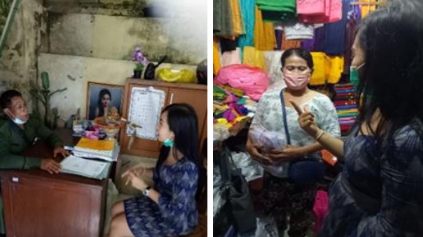Since the enactment of Law Number 6 of 2014 concerning Villages, it can be said that the era of Village autonomy in the Unitary State of the Republic of Indonesia began. The principle of autonomy is based on the assumption that closer governance is better, because it will result in governance that is run more precisely, faster and cheaper. At the village level, it can mean that the village government and village community must know their own village better, it really needs to be proven now. The spirit of village development planning starts from the bottom (bottom up) and is participatory. Planning is basically a policy that should be truly mature. Making development planning that involves all components of society is not easy. Often, development planning is merely a formality that is biased by the elite and the interests of individuals or groups.
The process of making planning or policies can be started by mapping the real conditions of community life that reflect the development of community aspirations that need attention in the planning process in the village. Analyze various possibilities that can be offered as alternative policies that are in line with the aspirations of residents. Through a bottom-up approach, the community has a great opportunity to convey their aspirations. To reduce distortion and oligarchy in policy making, a good public consultation process is very important to carry out. Public consultation as a process and strategy that is very useful and influences the quality of policy, needs attention to get a policy that is in favor of community groups. Read the atnews article, "Model of Strengthening Public Consultation in Making Aspirational Village Policies". Public consultation is basically a substantive communication process that aims to obtain policies that are supported by the community, so that they can be implemented properly. Public consultation as a process and strategy that is very useful and influences the quality of policies must be carried out properly and pay attention to the ideal criteria in implementing the public consultation process. Public consultation is currently an interesting phenomenon in policy making.
Activities carried out in public consultation are usually related to the preparation (draft) of policies, exploring problems, getting suggestions/input/support, and consensus in the policy making process. In the process, public consultation needs to be managed properly so that it becomes a meaningful/substantive process, not just a formality to eliminate the need for public consultation. The success of development implementation at the village level is basically determined by the extent to which the government and village community are committed and consistent in working together to build the village. The success of development carried out in a participatory manner starting from planning, implementation to monitoring and evaluation will better guarantee the sustainability of development in the village. On the other hand, problems and distrust of each other will easily arise when all communication and information space for the community is inadequate. This is where the importance of the public consultation process lies in making aspirational public policies. As a new technique for communicating in the policy formulation process, we still often encounter public consultation processes that are not managed seriously. In policy formulation, a public consultation agenda is prepared, but the material, parties or process are not in accordance with the essence of a public consultation (manipulative public consultation).
This public consultation is carried out only to fulfill procedures, formalities, and tends to be directed to simply fulfill/dismiss the obligation of public consultation. Real public consultation must be meaningful (substantive) so that it must be managed and directed to truly communicate with the community. The Government Science Study Program, Faculty of Social and Political Sciences, Warmadewa University has taken a real step through Community Service activities in Sumerta Kelod Village, East Denpasar District, Denpasar City with the theme "Model for Strengthening Public Consultation in Making Aspirational Village Policies". This service activity is indeed intended to provide understanding and training in order to strengthen the capacity of the parties (stakeholders) involved in policy making so that they can make more aspirational policies in the Village. The main targets of this community service activity are Village officials, BPD, LPM, community leaders, Kelian banjar and Head of Hamlet, PKK, and Karang Taruna in Sumerta Kelod Village.






